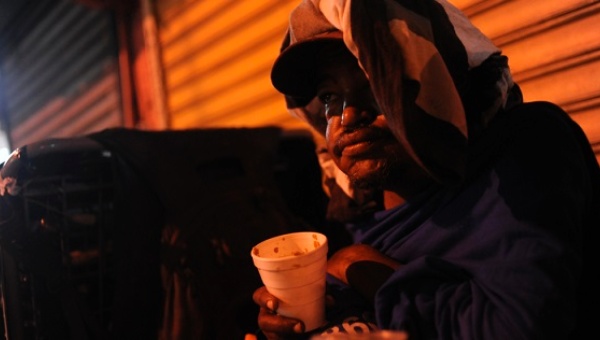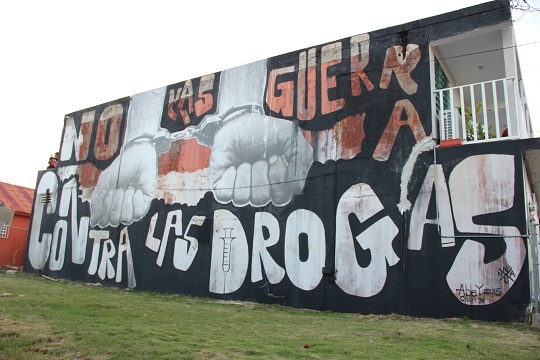Debt and Drugs: A Toxic Colonial Legacy for Puerto Rico
LATIN AMERICA AND THE CARIBBEAN, 29 Feb 2016
The island’s debt crisis and subsequent austerity cuts are exacerbating social problems.

Health care, affordable housing and drug treatment services have long been severely lacking in Puerto Rico, and the debt crisis is making the situation much worse. | Photo: Bill Healy
Under a century-old law called the Jones Act, all of Puerto Rico’s imports must come from American ships with American crews. Cargo can’t be purchased and offloaded directly from foreign ships – even if they pass Puerto Rico on their way to mainland ports. The severely inflated prices that result are one more reason that Puerto Ricans see the debt crisis, their dire economic outlook and their colonial status as all intertwined.
But one commodity proves a glaring exception to the import rule: illegal drugs that land in Puerto Rico in massive quantities, from Colombia and other parts of South America and the Caribbean.
Puerto Rico has long been a major transfer point for drugs thanks to its location and status as a U.S. Commonwealth. Once contraband makes it onto the island’s shores, it can be transported to the mainland with relatively little scrutiny.
The drugs don’t pass through without leaving their mark on the island, however. Drug addiction rates in Puerto Rico are sky high, with an estimated 60,000 intravenous drug users. Injection drug use has fueled HIV and hepatitis C infection rates among the highest in the Western Hemisphere.
Drugs are also the spark for Puerto Rico’s epidemic levels of street violence, including a murder rate that is still four times the U.S. average, even after dropping in recent years. Police officials and studies frequently report that more than two-thirds of murders are drug-related.
Health care, affordable housing and drug treatment services have long been severely lacking in Puerto Rico, and the debt crisis is making the situation much worse as social services are slashed, government jobs – a mainstay of the island’s economy – are eliminated, and people flee to the mainland. There is a dire health care crisis, with federal health care cuts of up to $3 billion looming along with the possible collapse of Medicaid and Medicare on the island.
How #WallStreet and #US #Colonialism Created #PuertoRico’s #Debt #Crisis https://t.co/QoQo1l3f7r
— Occupy Washington DC (@OWDC1) February 22, 2016
The lovely streets of Old San Juan showcase the very different sides of Puerto Rico. The area teems with tourists, who walk without a second glance past destitute people in rags, struggling to scrounge enough money to feed their addictions and to simply stay alive. A plethora of police officers and private security guards patrol Old San Juan to keep it safe and attractive for tourists.
With local residents, law enforcement takes a much different approach. The police department is under federal monitor because of widespread abuse and corruption, revealed by the ACLU in an extensive 2012 report. Nonetheless the problems with police have continued; for example in September, 10 officers were charged with planting evidence, stealing drugs and other misconduct.
The ACLU documented police abuses surrounding a 2011 major drug raid in La Perla, a hardscrabble neighborhood in Old San Juan that clings to the seaside. Tourist guidebooks describe it as a terrifyingly dangerous slum, but in reality, residents say theirs is a vibrant and tight-knit community struggling to survive where jobs are few, and the drug trade is a base of the economy. Neighborhoods like La Perla show how the colonial economy of tourism and tax-free industry once located on the island has failed to sustain regular Puerto Ricans, trapping them in a financial crisis that started long before the debt debacle made headlines on the mainland.
Rafael Torruella is the executive director of the needle exchange and drug policy organization Intercambios Puerto Rico, a San Juan native who cut his teeth on harm reduction work in New York City.
He sees the addiction, health and homelessness crises as directly linked to the island’s colonial status, degraded economy and drastically punitive criminal justice policies that seem designed more to control than to serve the population. He notes that in Puerto Rico simple possession of marijuana in a “recreational area” can bring a 10-year prison sentence. Meanwhile, research shows that more than eight in 10 of Puerto Rican inmates have hepatitis C, as drugs are readily available behind bars but inmates share sparse needles.
Along with sending addicts to jail and prison, Puerto Rican authorities regularly send people with addictions off the island.
Hundreds have been sent to treatment programs in the mainland U.S., including questionable facilities that lack medical staffing and evidence-based treatment and rely on systematic shaming and emotional abuse. As an investigation by journalist Adriana Cardona-Maguigad showed last year, scores of Puerto Ricans have been sent to unlicensed, questionable rehab centers in Chicago, many of them ending up homeless and desperate in a city where they have no safety net.
Puerto Rican authorities readily acknowledge that they send people to these and other treatment centers on the mainland. “There finding work is easier, we have a small island,” said Alexander Santiago Martinez, an administrator of the Nuevo Amanecer program in the city of Bayamon.
But Puerto Rican authorities have provided no evidence to show their charges find work on the mainland, and the phenomenon equates to the island exporting its social problems. This could be seen as only fair, given that the colonial relationship with the U.S. is interwoven with the island’s problems. But for individuals it can mean a limbo-like existence moving between the two locations, without needed resources at home and cast adrift without community on the mainland.
There is a serious shortage of substance abuse-related resources and health care on the island. Public institutions make up only a small fraction of the treatment that is available, with those scant options surely in the cross hairs of debt-related cuts. The vast majority of harm reduction and drug treatment work is done by private providers often operating on shoestring budgets.
Intercambios Puerto Rico and the organization Iniciativa Comunitaria are among a coalition of harm reduction organizations that offer needle exchange, food and basic health services to the homeless, drug users, sex workers and other vulnerable, disenfranchised people. Their staff and volunteers ply the streets and shooting galleries, offering aid and moral support. On one such “ronda” in February, volunteers with Iniciativa Comunitaria shared stories and songs with a wizened heroin user, cleaned skin ulcers, collected dirty needles and disbursed clean ones, served soup to men huddled in shuttered marketplaces or young women waiting to sell their bodies.
Iniciativa Comunitaria, which also runs detox and rehab centers, suffered a significant cut in Puerto Rican government funds last year, forcing them to close two programs including day care for homeless families and case work, said spokesperson Yorelys Rivera.
“Most of the nonprofits are suffering” in the current economic crisis, she said. “This is the reality we live in.”
The people on the streets of San Juan – like most Puerto Ricans – talk about “the U.S.” as a different country entirely. Many have lived in the mainland United States, working factory or service jobs, staying with family, or sent for drug treatment. They’ve ended up homeless back in Puerto Rico because of a web of factors – no jobs or affordable housing, criminal records, mental illness and substance abuse.
“With the economic crisis, the social crisis is growing, more people are ending up in the street,” said Eduardo Vazquez, a volunteer leader of the ronda.
As harsh as the cuts have already been, more drastic measures are sure to come as Puerto Rico tries to pay its debts and the hemorrhaging of population off the island reduces the tax base and shrinks the local economy. For those on the streets with addiction and illness, the future looks grim. And it appears their ranks will only be growing.
“Eliminating public services like public transportation deprives the most marginalized communities,” says a flier distributed by Intercambios as part of its Decriminalization campaign to end the drug war. “It creates empty cities abandoned to the mercy of crime. And closing schools leads to school dropouts, unemployment, violence and other problems, with high social costs for the country.”
________________________________
Kari Lydersen is the author of Mayor 1%: Rahm Emanuel and the Rise of Chicago’s 99% (Haymarket Books, 2013). She is a long-time Chicago journalist and journalism instructor and co-director of the Social Justice News Nexus fellowship program at the Medill School of Journalism at Northwestern University.
Go to Original – telesurtv.net
DISCLAIMER: The statements, views and opinions expressed in pieces republished here are solely those of the authors and do not necessarily represent those of TMS. In accordance with title 17 U.S.C. section 107, this material is distributed without profit to those who have expressed a prior interest in receiving the included information for research and educational purposes. TMS has no affiliation whatsoever with the originator of this article nor is TMS endorsed or sponsored by the originator. “GO TO ORIGINAL” links are provided as a convenience to our readers and allow for verification of authenticity. However, as originating pages are often updated by their originating host sites, the versions posted may not match the versions our readers view when clicking the “GO TO ORIGINAL” links. This site contains copyrighted material the use of which has not always been specifically authorized by the copyright owner. We are making such material available in our efforts to advance understanding of environmental, political, human rights, economic, democracy, scientific, and social justice issues, etc. We believe this constitutes a ‘fair use’ of any such copyrighted material as provided for in section 107 of the US Copyright Law. In accordance with Title 17 U.S.C. Section 107, the material on this site is distributed without profit to those who have expressed a prior interest in receiving the included information for research and educational purposes. For more information go to: http://www.law.cornell.edu/uscode/17/107.shtml. If you wish to use copyrighted material from this site for purposes of your own that go beyond ‘fair use’, you must obtain permission from the copyright owner.
Read more
Click here to go to the current weekly digest or pick another article:
LATIN AMERICA AND THE CARIBBEAN:
